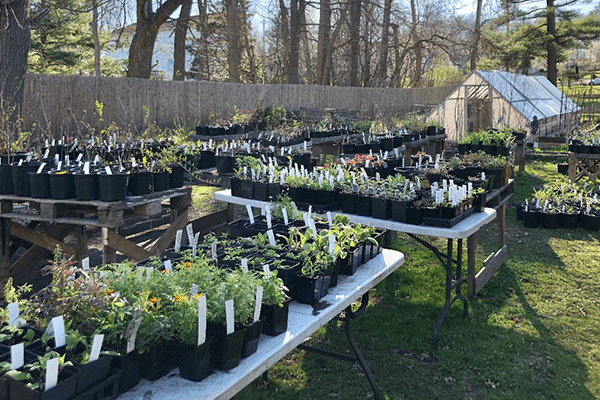Cottage Creek Gardens Grew Exponentially During Coronavirus Gardening Explosion
By Tina Traster
Sometimes a plot of land becomes a palette for a passion. More rarely, that passion turns into a commercial venture because family, friends, neighbors, and the community want what you are creating.
Such is the tale of Cottage Creek Gardens, a family-run nursery that has been selling herbaceous perennials, natives, house plants, and seasonal seedlings grown on a cultivated plot of land in Jennifer Giunta’s Valley Cottage backyard for three years. Now, the home-based business is planting a new seed with a retail presence at 161 Main Street in Nyack. The store, which will sell seeds, plants, and giftware in its indoor and outdoor space, aims to open by late October.
Cottage Creek Gardens has slowly built a steady following via Facebook and word-of-mouth in its short stint but the coronavirus pandemic, which triggered an explosion of interest in gardening, convinced Giunta it was time to roll the dice and commit to a year’s lease for a retail shop.
“The pandemic pushed us into high gear,” she said. “Demand doubled this season. So did revenue.”
Cottage Creek Gardens pivoted quickly to become a pandemic-friendly company, making it easy for customers to order online, offering delivery, and curbside pickup.
“We did consultations by email and Facetime,” said Giunta. “We were able to meet people wherever they were. We offered customers the option to make an appointment to come to the nursery and do masked, safety-distanced browsing. We ran out of a lot of things, but we worked directly with customers on alternatives.”
“Gardening is an art form, a means of self-expression, and a physical release,” said Giunta. “We instinctively know it is healthy for our body and our state of mind.”
With so much time at home during the lockdown, people turned inward, their homes became a sanctuary, and gardening – whether it was indoors or out – was one way to take control over a world that felt random and uncertain. As spring crept up, there was more time than ever to scour one’s domain and question how to improve or beautify it.
“Americans have long turned to the soil in moments of upheaval to manage anxieties and imagine alternatives,” said Jennifer Atkinson, an Associate Professor of environmental humanities at the University of Washington, “My research has even led me to see gardening as a hidden landscape of desire for belonging and connection; for contact with nature; and for creative expression and improved health. These motives have varied across time as growers respond to different historical circumstances. Today, what drives people to garden may not be the fear of hunger so much as hunger for physical contact, hope for nature’s resilience and a longing to engage in work that is real.”
Plugging into the pandemic zeitgeist and conforming to its restrictions not only kept Cottage Creek Gardens alive – it allowed it to sprout new shoots, so to speak. The store, which Giunta says will be “competitively priced” with big boxes like Home Depot, will also sell art from local artisans, pottery, jewelry, cards and books and vintage home furnishings.
Giunta, her husband Duncan Bell, and their children Evelyn and Carlo moved from Nyack three years ago to the Valley Cottage house with more than a half-acre of land. For 25 years, Giunta worked at the 92 Street Y in Manhattan in educational programming. In whatever way was possible with whatever space she had she pursued her love of gardening. Self-taught, she took classed from the New York Botanical School of Professional Horticulture and the Cornell Cooperative Extension. She also held the position of director of education for the Garden Conservancy in Garrison. Bell, a former Pfizer biomedical engineer, who has a PhD in botany, specializes in creating motorized displays and automated watering systems.
Cottage Creek Gardens is an all-hands-on-deck family affair: the couple’s daughter Evelyn will handle business administration, website development and social marketing, while son Carlo engages in gardening and maintenance.
Giunta says she signed the lease in mid-July, fully aware of the havoc and shifting sands brought on by the pandemic but felt confident to forge ahead.
“We’re definitely putting a little bit of our retirement resources on the line,” she said. “I am a bit concerned. I’m aware of the risks. But we’ve been looking for a space for awhile and now feels like the right time.”










